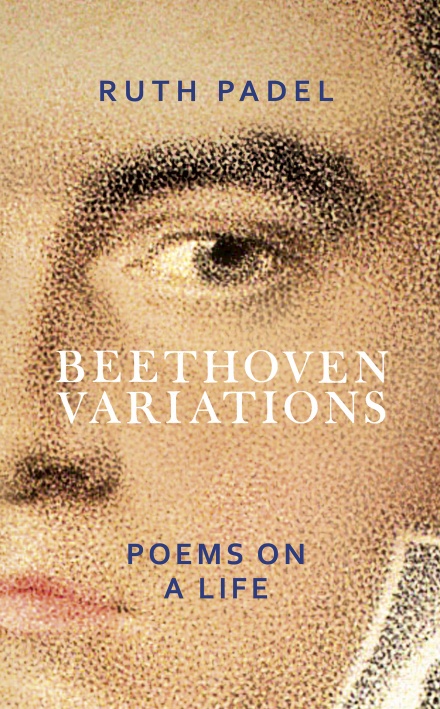Many collections published over the last few years have fused poetry and biography, invoking historical, mythical, and religious characters. Poetry, in many ways, is the art of conjuring – be it specific images, emotions and speakers, or whole landscapes and decades-long sagas. These subjects, of course, can be either ‘real’ or fictional: often both; sometimes neither. Poetry is often used as a tool to undermine, re-write or expand the parameters of representation and the lyric ‘I’ – opening up new and unexpected dialogues with history.
In Luke Kennard’s Cain (Penned in the Margins, 2016), a character named Luke Kennard is inserted into the narrative. This Luke is treated by a psychiatric nurse who claims to be the living embodiment of Cain from Genesis 4:9-12. In Fiona Benson’s Vertigo & Ghost (Cape, 2019), the Greek god Zeus is a depraved predator on the loose – reimagined through Trumpian rhetoric and all-caps syntax. Ruth Padel’s latest collection, Beethoven Variations: Poems on a Life (Chatto & Windus, 2020), however, emerges from a tangible history that’s much closer to the poet’s home. It is one rooted less in the ephemeral, but in the archives of the western world’s most famous classical composer:
String trio, G Major, Opus 9.
‘Growing Up with Beethoven’
First time I hear my viola’s true clear voice,
more awkward for my stiff hand
than the free bird singing in my throat –
as if I were two beings, the soprano
soaring upward unafraid
and the shy voice of blending in –
but I can see Beethoven has given each of us
something different to say. Mischief and hope: I like that […]
Drawing from biographical notes, letters, and diary entries, the contextual proximity is easily identifiable. Padel’s parents met through music, and she grew up playing chamber music on viola – Beethoven’s favourite instrument. Her great-grandfather was a concert pianist, and studied in Leipzig with a friend of Beethoven before emigrating to the UK. Padel embraces her lineage, offering it up to the reader in a tight marriage of subject matter and form, with ‘open shirts’, writing-desks, and various Opera written into phrases that rise and fall as crescendos and diminuendos. And, like any accomplished musical score, there is a reason for each twist and turn; each word is as considered as a finger pressed on a key.
From the get-go, the collection is self-conscious of its invocation, the notes pronounced and intentional: ‘They say the ear bone, shaped like the bowl / of a tiny spoon, lasts longest when we die’ (‘Listen’). In these first two lines, Padel demonstrates the extent of her craft with an anecdote that is completely fascinating in its own right, whilst holding a plethora of objective, emotional, and sensory truths underneath the surface. The image, on top of its satisfying internal rhymes (‘bone’ / ‘bowl’; ‘tiny’ / ‘die’), is authentic to the world of Beethoven, who was a known synaesthete, and experienced a blending of the senses. Sound, here, is linked to taste: to nourishment. Padel also manages, in such little space, to suggest that – as readers and listeners – we continue to be sated by Beethoven’s music and legacy beyond his lifetime, as well the delicious potential of poetry to play with ‘truth’ and memory, sounding the notes of the dead and feeding their presence. Indeed, art persists in living – to be resurrected and made anew (this latest collection is, perhaps, Padel’s Waste Land). There is one last flourish to note – a lick of dramatic irony to wrap the whole business in a tight bow – with the idea that ears might persist in existing, despite their capacity to take in information being long gone, even before death in this case. Beethoven spent his last decade completely deaf, having noticed changes in his hearing as early as his late twenties:
The music of loss, of losing. Bass clef.
‘Moonlight Sonata’
High treble only once
and in despair. Then the new
shocked calm of Is it true. Is this
what it sounds like, going deaf?
It is here that Padel pulls at the strings of the human condition and ties the personal and universal together as one and the same. Music, poetry, relationships – gifts for our time on earth – are short-lived for those who experience them, but their presence continues for those who come next:
Melody and rhythm flow from the molten blue
‘Human Fire’
of summer hills.
But there’s a coppery stain
on the rising moon. You know creation comes
with pain. The stolen gift draws punishment in its wake
and ends in the rock, the vulture and the chain.
You stride on through the woods. You believe
in freedom. Human fire, created out of clay.
And, for readers in search of serendipity – for the collection to continue as an homage – Padel is generous. The sequencing is like a 4/4 beat, with four sections – ‘Music in the Dark of the Mind’, ‘Virtuoso’, ‘Hero’, and ‘You Must Not Be Human’ – signifying quarter beats to the whole. An invisible metronome ticks over this pronounced and lyrical collection, and it lingers in the mind. Though Padel demonstrates the power of poetry to complicate timelines, this clock-work collection is so deftly realised, it’s as if there could be no reality in which these poems do not exist; in which Beethoven’s masterpieces weren’t created; in which Padel’s route into poetry not be informed by an innate comprehension of music.
Kate Simpson is Associate Editor at Aesthetica Magazine, and Editor at Large for Valley Press. She is editor of Out of Time: Poetry from the Climate Emergency, published this July to coincide with 50 years of Friends of the Earth.

Beethoven Variations by Ruth Padel (Penguin)
Add your Reply
You must be logged in to post a comment.